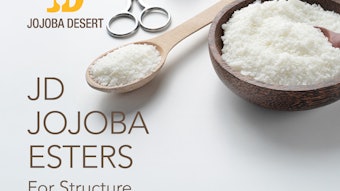As the demand for natural and/or sustainable personal care products increases, the popularity of formulating with natural oils has grown. Before using a natural oil, however, the formulator should understand how they are processed and how the process can alter the oil. The processing technique used to remove the oil from a seed can change not only what is extracted, but also what is lost (including antioxidants).
The simplest technique for obtaining oils is pressing. Oil that is derived from a seed that has been pressed and filtered can be referred to as virgin oil. If there was no heat applied to the process, the process is called cold pressing. This process provides an oil with desirable attributes that are missing from oils processed using other techniques.
Grape seed oil, for example, can be cold-pressed, as seen in US Pat. 7,226,627, which states, "The present application relates to a process for preparing cold-pressed grape seed oil, and to food, food supplements, food additives, fine food, animal food, animal food supplements, medicaments and cosmetics/skin care products comprising the cold-pressed grape seed oil prepared by said process, as well as to the enrichment of the above mentioned matters/agents, and also to the enrichment of wine and other beverages, cold-pressed grape seed oil and other oils with cyclic polyphenols and other active substances which can be extracted from the crushed seeds obtained in the process. The application also relates to the cold-pressed grape seed oil prepared by said process, the crushed seeds obtained in the process and mixtures thereof."
Oftentimes, heat is applied to the process after pressing and filtering. This increases the quantity of oil obtained, but can alter the composition, flavor and odor.
The process that yields that highest amount of oil is when a solvent is used. In this process, oil is dissolved in solvent, where insoluble materials are removed. The solvent is then evaporated, leaving the oils but not materials that are insoluble in the oil. Although this process yields the highest amount of oil, it also removes the actives.
The selection of the proper process for cosmetic applications depends upon why a particular triglyceride is being used in the formulation. If the triglyceride is desired merely as an oil phase, the process used is of little significance. If the triglyceride is used for content of actives, including antioxidants, the choice is critical. Solvent extraction results in removal of much of the desirable actives.
Refining is yet another process that can remove desirable active compounds. This is performed by filtering the oil through clay or silica, which can remove color bodies and other desirable compounds.
Cold-pressed oils benefit formulators by offering many of the naturally occurring ingredients that are removed with processing including antioxidants and desirable actives. These ingredients have been known to stabilize fragrances and ensure the oxidative stability of unsaturated oils. Cold pressed oils typically are darker in color, which may be a drawback in some formulations. The formulator needs to look at the different oils available and pick the one that results in the best overall formulation.










